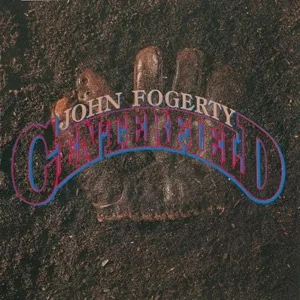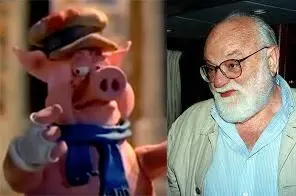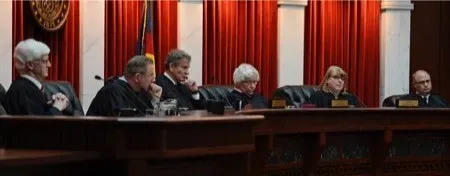Once upon a time, there was a band called the Creedence Clearwater Revival. They did quite alright for themselves, for a while anyways.

Known as CCR, these four fellows put nine songs in the Billboard Top 10, five of which were in the Top 2. They were inducted into the Rock and Roll Hall of Fame and Rolling Stone named them among the top 100 greatest artists of all time. They headlined Woodstock…
And they frickin’ hate each others guts.
It wasn’t always like that, but someone is usually the principal songwriter and gets most of the attention and more and more decisions start hinging on their opinion. A little bit of tension can explode when placed under the pressure of rigorous touring and studio schedules.
But it rarely descends to these levels of silliness… where you end up getting sued for the fact that you sound like yourself.

The Timeline Leading to John Fogerty Being Sued
So here’s how it went down… Be John Fogerty. Be the guy that wrote all the hit singles for CCR like:
- Proud Mary
- Down on the Corner
- Bad Moon Rising
- and the rest.
Eventually it becomes 1970 and you write a song called “Run Through the Jungle” for a CCR record that ends up going Gold. Tensions are rising in the band and people are starting to take sides.
The owner of Fantasy Records, Saul Zaentz, who’s been happily publishing your records takes advantage of the situation like most business-people do and buys the rights to the masters before the poo hits the fan. CCR accounted for something like 99.9% of all of Fantasy Records sales and now the company is set for life.
The natural progression of bands breaking up continues until the band breaks up. Everyone goes their separate ways and that could have been that. But Fogerty goofs up and writes a few diss tracks about Saul Zaentz on his 1985 solo record Centerfield.

And that’s how it all began…
Fogerty’s Centerfield Does Good… Real Good
John Fogerty had been quiet. Although this was his 3rd solo album, there’d been a nine year gap since his last one. His 2nd solo album Hoodoo was a self-proclaimed flop and his current label Asylum Records wouldn’t even publish it unless it was improved substantially. They eventually shelved the whole thing.
That’s why, when Centerfield started slaying it with several hit singles, people were somewhat caught off guard. Fogerty actually recorded every single instrument on the album himself using overdubbing in the studio. It’s almost like nobody expected much out of it including Fogerty, which explains why he might have thought it would be okay to slide those diss tracks against Saul Zaentz in there.
A lot of variables came together to turn this whole charade into a giant circus. Asylum Records happened to have been bought and merged into Warner Bros. Records… a giant in the recording industry.
Zaentz heard the diss tracks against himself. Fogerty even ended up in the National Baseball Hall of Fame due to the title track “Centerfield” becoming the second most beloved baseball song behind “Take Me Out to the Ballgame.” They even hooked him up with a baseball bat-shaped guitar.

The record ended up going double Platinum… And that, my friends, is how you paint a target on your back.
Fogerty opened old wounds with the two songs:
- Mr. Greed
- Zanz Kant Danz
Which were about Saul Zaentz from Fantasy Records, who still owns all of the old CCR material.
Click to Stream & Download Centerfield
The Fantasy, Inc. v. Fogerty Series of Lawsuits
Zaentz saw Fogerty making all this cash and decided to get back at him.
Defamation Lawsuit
Warner Bros. Records and Fogerty saw it coming and quickly retitled the song as “Vanz Kant Danz” and reprinted the records. Too late. Especially after filming a claymation video depicting Zaentz as a literal pig that takes on all kinds of villainous costumes to rob you.

Zaentz hit Fogerty with a defamation lawsuit for $144 million dollars, saying that Fogety had portrayed him as:
“a Thief, Robber, Adulterer, and Murderer.”
Jimmies were rustled, Fogerty knew he screwed up, and they settled out of court for some undisclosed amount.
Plagiarism Lawsuit
Some people don’t know when enough’s enough and decide to “sweep the leg” (shameless Karate Kid reference). Zaentz sues a second time, this time with the claim that Fogerty had plagiarized a song that Zaentz owns… a song that Fogerty himself wrote!
Fogerty later explained:
“They filed a lawsuit claiming that the latter was a ripoff of the former — alleging that ‘The Old Man Down the Road’ was just ‘Run Through the Jungle’ with different words.”
This lawsuit went straight into Federal Court for copyright infringement. “The Old Man Down the Road” was the hit single off of Centerfield, and it was pretty plain to see what was going on here. This was war.
Before we go further, you might enjoy making your own decision on whether or not Fogerty truly rewrote his own song from over a decade before or if there was some shenanigans going on.
Run Through the Jungle
Here’s ‘Run Through the Jungle’ from Creedence Clearwater Revival’s album Cosmo’s Factory from 1970.
Nice tune.
The Old Man Down the Road
And here’s Fogerty’s ‘The Old Man Down the Road’ from Centerfield from 1984.
Cool, low-budget video.
Did you make a surface level decision on if he ripped himself off or not? Because here’s what the judge of the case ultimately said… “You can’t plagiarize yourself.” It didn’t even come down to whether or not he did or didn’t, just that it’s impossible!
The court case only dragged on for 2 weeks and the nail in the coffin was when John Fogerty brought his guitar in and played for the judge and jury. He explained that his style is that of swamp rock and that explains the similarities (beyond the fact that the same guy wrote both songs).

Case closed. It was agreed that to the less discerning listener not familiar with his style that they might sound similar, but in fact they were wholly separate and distinct compositions.
The only problem now is that Fogerty already paid Zaentz millions and now is looking at another million-plus in attorney and court fees.
supreme court Countersuit
The Copyright Act of 1976 allows for the prevailing party (the winner) to make the loser pay for their court costs. Fogerty wanted Zaentz to pay for this nonsense based on this Copyright Act, but the court decided that they felt Zaentz case was “in good faith and not frivolous” (despite his previous defamation lawsuit) and thus Fogerty had to shoulder the burden.
The problem was that, if the plaintiff wins, he or she can always force the defendant to pay for the legal fees. But if the defendant wins they have to prove that the plaintiff was being a ding-dong and wasting everyone’s time and money. Fogerty said this was a double standard and pushed the issue.
Interestingly, the Ninth Circuit court of appeals couldn’t agree. Half thought Fogerty was right while the other half didn’t. So the entire situation was escalated to the Supreme Court!

Chief Justice William Rehnquist spoke on behalf of all of the Court member’s except for one, and it boiled down to this quote:
“The primary objective of the Copyright Act is to encourage the production of original literary, artistic, and musical expression for the good of the public.”
What was honestly a cool move on the side of the judge was his understanding that the Copyright Act doesn’t exist for the plaintiff or the defendant, but for the people. And to punish artists after successfully defending themselves is to stifle and de-incentivize creativity, which only hurts the rest of us.
The sole goal of the copyright law isn’t to prevent infringement upon intellectual property, but to encourage creativity and the broad public availability of these works for the general public good.
Preach. Of course nobody wants to have someone else steal their own song and get paid for it, but this is a guy sitting in front of the Supreme Court risking having to pay over $1,000,000 because he developed his own musical style. Thank goodness corruption didn’t prevail on that good day (like it did with the parental advisory case), because this ruling set a precedent that surely stops a lot of lawsuits with negative and false intentions.
John Fogerty’s Happy Ending? Not Quite…
I’m happy that Fogerty was able to at least not have to pay the court costs to defend such a silly case. But it doesn’t stop there, not by a long shot. It’s an entirely ‘nother story, but I’ll give you the quick run down of how the lawsuits continued.
Fogerty once again stirred the pot in 1993 when Creedence Clearwater Revival were inducted into the Rock and Roll Hall of Fame. He refused to allow the drummer Doug Clifford and the bassist Stu Cook to perform along side him at the end-of-ceremony jam (the 4th member, Fogerty’s brother Tom, had passed away at this point).
Stu Cook and Doug Clifford decide that reinforce the fact that they were a part of this amazing band, so they kick off a reunion tour without Fogerty called Creedence Clearwater Revisited.

Fogerty sues for copyright infringement and then Cook & Clifford sue back because Fogerty has been playing some classic CCR songs live. Fogerty says publicly:
“No lawyers, lawsuits or angry ex-band members will stop me ever again from singing my songs.”
Finally they drop it all and it’s agreed that Cook & Clifford can do the tour as “Revisited” as long as they cut Fogerty in on the profits from ticket sales and merchandise. Later Clifford & Cook admit that they sued Fogerty to get the jump on him because they knew another lawsuit was coming… one surrounding non-payment of the royalties from the tour.
Turns out not only did they not pay Fogerty for the tour royalties, but he’s been having to file lawsuits annually since 1980 to get his songwriter royalties from all of the old CCR material from Fantasy Records.
“Fantasy own the songs and they’re supposed to pay me as the songwriter, but I’ve had to fight to get royalties from 1980 and every year after that. Basically, to get paid I had to sue them, that was their stance.”
What a sad, sad story. And of course, we don’t even know half of the full truth of all of the bitterness and poor conducting of business.
All I can say is thank you to all of them for their contributions to the music industry and especially for pumping out some amazing records… and to get it together and stop acting like babies.